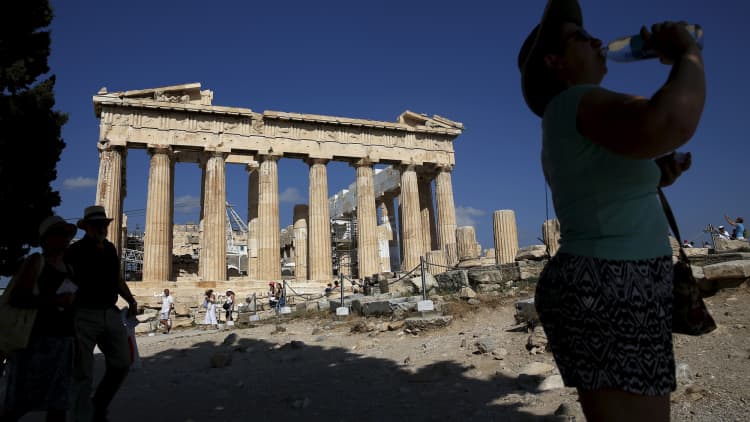
For the last five months, global markets, economists and politicians have had to watch the slow car crash that is the reforms-for-rescue talks between Greece and its creditors.
But events look set to quickly come to ahead in the coming week as Greece looks unlikely to make a 1.6 billion euro ($1.79 billion) payment due to the International Monetary fund (IMF) on June 30.
Here is the lowdown on what's preventing a deal from being struck in the latest round of talks in Brussels.
Q. What are the latest reforms Greece has proposed?
A. As reform talks with creditors reached crisis point this week, Greece presented new a set of proposals on Monday. This was followed by a list of "prior actions" – officialese for the fine print – Tuesday, detailing the steps it would take in order for it to qualify for a last tranche of bailout aid worth 7.2 billion euros.
Much to the chagrin of those overseeing Greece's bailout program -- the European Commission, European Central Bank and International Monetary Fund -- the reforms document, published by the Financial Times, centred on raising taxes rather than on spending cuts, which creditors have demanded.
While Greece proposed raising taxation on businesses and the wealthy, as well as some sales tax increases, it also said it would slowly phase out early retirement from 2016 to 2025 but that it would maintain a special benefit for some low-income pensioners. It also said it would meet creditor demands for a primary budget surplus of 1 percent in 2015 and 2 percent in 2016 too.
Q. So what's the problem?

A. Greece's reform measures did not come up to the standards demanded by its creditors, who sent back the proposed reform package covered in red ink corrections and proposals crossed out.
It's certain that Greece had "red lines" of its own in the proposals, however. Athens said it would not carry out some privatisations or raise sales tax on restaurants and electricity, as required by lenders. In fact, it said it would cut, rather than raise, the levy on medicines. It also said it would not cut public sector wages. Of the reported 7.9 billion euros that the Greek government said the plan would raise, 92 percent came from tax increases.
Q. What happens next?
A. Greek Prime Minister Alexis Tsipras has been getting used to living out of a suitcase this week with a raft of meetings in Brussels between the Eurogroup of finance ministers and euro zone leaders.
On Thursday, more meetings are planned to discuss the impasse over reforms. However the Eurogroup meeting of euro zone finance ministers failed to make any headway Thursday ahead of a European leaders' summit.
Both sides seemed to have firmly stuck to their arguments, with the Greek delegation not budging in their proposals and the creditors offering up their own list of reforms.
Q. What happens if a deal is struck?
A. Even if Greece and its creditors happen to strike lucky and reach an agreement before June 30, when Greece owes the IMF 1.6 billion euros in debt, it's problems aren't over.
The reform measures would have to be approved by the Greek parliament and there are already parts of the government – hardliners within Tsipras' Syriza party and those within its coalition partner, Independent Greeks -- who say they will vote against the proposals as they are now.
Indeed, while the reforms did not go far enough for creditors, they went too far for vast swathes of the Greek people, prompting pensioners and young alike to protest in Athens.
Read MoreRead our Live Blog on Greece
As such, Tsipras faces an unenviable decision – whether to appease Greece's international creditors and risk hostility at home, or to maintain Greece's reputation on the world's stage and sacrifice his own standing in the eyes of his anti-austerity peers and people.
Q. What about if there's no deal?
A. If Greece fails to reach a deal – or the Greek government rejects a deal – and the country defaults on its debt to the IMF, markets are fearing all economic hell to break loose for the country.
The ECB would likely stop its emergency funding for Greek banks and the country's central bank would have to impose capital controls to avert a bank run. Apart from the financial instability of a deal not being found, Athens could face a stark choice on whether to stay in the euro zone, according to Deutsche Bank.
Deutsche Bank economists Mark Wall and Marco Stringa and strategist George Saravelos warned in a note last week that if there is no agreement and there is a non-payment event to the IMF, a referendum on the creditor proposal and euro zone membership is possible – potentially causing more uncertainty.
"If the government rejects an agreement, the suspension of ECB financing would be likely," the analysts wrote.
"A referendum would likely take two weeks to organize. Alternatively, there may be renewed attempts at negotiation or an early general election. We would consider the latter very unlikely, as an election would take around a month to organize causing prolonged uncertainty and economic damage."
"Government cash buffers are running low, and it remains unclear if sufficient resources are available to pay wages and pensions over the course of next month," the bank said.
- By CNBC's Holly Ellyatt, follow her on Twitter @HollyEllyatt. Follow us on Twitter: @CNBCWorld


